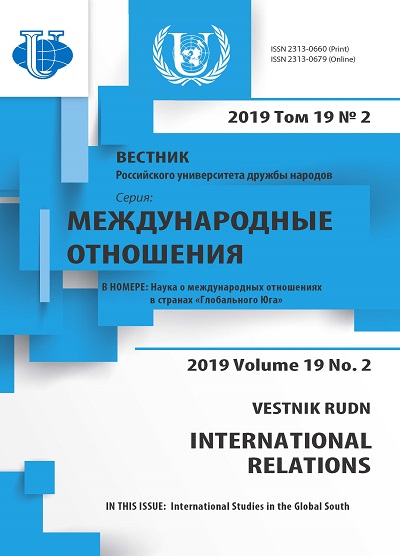Oliver Tambo’s International Policy: Unique Features of the South African Foreign Policy Process and Personality Factor
- Authors: Arkhangelskaya A.A.1,2
-
Affiliations:
- Institute for African Studies, RAS
- Higher School of Economics
- Issue: Vol 19, No 2 (2019): International Studies in the Global South
- Pages: 293-301
- Section: POLITICAL PORTRAITS
- URL: https://journals.rudn.ru/international-relations/article/view/21467
- DOI: https://doi.org/10.22363/2313-0660-2019-19-2-293-301
- ID: 21467
Cite item
Full Text
Abstract
The aim of the work is to develop an understanding of the role of Oliver Tambo as the actual head of the foreign policy department of South Africa during the period of implementation of the policy of apartheid and the process of decolonization of the African continent. The author’s thesis is that the African National Congress (ANC) foreign policy during the period of South Africa’s activities as a state supporting racial segregation was of the nature of external representation. The development of foreign policy was identical to the formation of a new state. The uniqueness of the analyzed situation is expressed in the fact that for the first time in history, international relations were established not only by a party that does not politically agree with state ideology, but also does not show its loyalty to any political blocs. The theses presented by Oliver Tambo in the conditions of the Cold War were democratic, consistent with the principles of civil choice and were not identified as the need for armed confrontation. It is these aspects that enabled the transition of power to the radical majority to avoid prolonged civil wars or conflicts involving international armed groups. The basis of the methodology is the understanding of the international process during the liberation of Africa and the choice of allies for this process by representatives of the leading world powers. The author uses the historical method and the method of direct oppositions of the position of Oliver Tambo and a significant number of ideological proposals from the leading world powers of the time under investigation. The article shows that the activities of Oliver Tambo fully comply with the regulations and traditions in the performance of their functions by the foreign affairs ministries. The author argues that the leading role of the ANC and O. Tambo in particular is to ensure the preservation of stability in the socioeconomic development of South Africa with the transit of power in the 1990s and the preservation of the pace of development of South Africa in the 2000s. The work examines the period from the appointment of O. Tambo to the post of Secretary General of the ANC to his death. It is noted that, in addition to the revealed features of O. Tambo’s activities for South Africa for the general theory of international relations, the above facts showed how to build cooperation with non-institutional actors in world politics.
About the authors
Alexandra Alexandrovna Arkhangelskaya
Institute for African Studies, RAS ; Higher School of Economics
Author for correspondence.
Email: aarkhangelskaya@gmail.com
PhD in History, Researcher, Center of Southern African Studies, RAS, Leading Researcher, Higher School of Economics
Moscow, Russian FederationReferences
- Callinicos, L. (2004). Oliver Tambo: Beyond the Engeli Mountains. Claremont, South Africa Johannesburg: David Philip; Thorold’s Africana Books distributor.
- Crais, C.C. & McClendon, T.V. (2014). The South Africa Reader: History, Culture, Politics. Durham: Duke University Press.
- Davidson, А.B. & Filatova I.I. (2012). Russia and South Africa: Building Bridges. Moscow: Higher School of Economics publ. (In Russian).
- Ellis, S. & Sechaba, T. (1992). Comrades against Apartheid. The ANC and the South African Communist Party in Exile. London, Bloomington (Indiana).
- Feraudy Espino, H. (2012). África en la Memoria. La Habana: Editorial de Ciencias Sociales.
- Geldenhuys, D. (1984). The Diplomacy of Isolation. South African Foreign Policy Making. Johannesburg.
- Johns, Sh. & Davis, R.H. (Eds.) (1995). Mandela, Tambo and the African National Congress. The Struggle against Apartheid, 1948—1990. A Documentary Survey. New York, Oxford: Oxford University Press.
- Jordan, Z.P. (2007). Oliver Tambo Remembered. Johannesburg: Pan Macmillan.
- Lipton, М. (1972.) The South African Census and the Bantustan Policy. The World Today, 28 (6), 257—271.
- Macmillan, H. (2009). The African National Congress of South Africa in Zambia: The Culture of Exile and the Changing. Relationship with Home, 1964—1990. Journal of Southern African Studies, 35 (2), 303—329.
- Mandela, N. & First, R. (1965). No Easy Walk to Freedom: Articles, Speeches, and Trial Addresses. New York: Basic Books.
- Morgenstierne, Ch.M. (2003). Denmark and National Liberation in Southern Africa. Uppsala: Nordiska Afrikainstitutet.
- Othman, H. (2000). Reflections on Leadership in Africa: Forty Years after Independence: Essays in Honour of Mwalimu Julius K. Nyerere, on the Occasion of his 75th Birthday. Brussels: VUB University Press.
- Prevost, G. (2007) Revolutionaries in Power: The Evolution of the African National Congress. In: From Revolutionary Movements to Political Parties / Ed. by K. Deonandan, D. Close, G. Prevost G. Palgrave Macmillan, New York, p. 133—156.
- Shubin, V.G. (1999). African National Congress in Time of Underground and Military Struggle. Moscow: Institute for African Studies publ. (In Russian).
- Sundsgård, E. & Mabuza, L. (1987). African National Congress. To Sweden from ANC. Stockholm: Swedish Social Democratic Party.
- Tambo, O. & Tambo, A. (1988). Preparing for Power: Oliver Tambo Speaks. New York: G. Braziller.
- Tambo, O. (1987). 75 Years of Struggle. Bundoora, Vic.: LaTrobe University.
- Urnov, A.Yu. (1982). South African Politics in Africa. Moscow: Nauka publ. (In Russian).
- Van Wyk, C. & Callinocos, L. (1994). Oliver Tambo. Cape Town: Maskew Miller Longman.
Supplementary files










